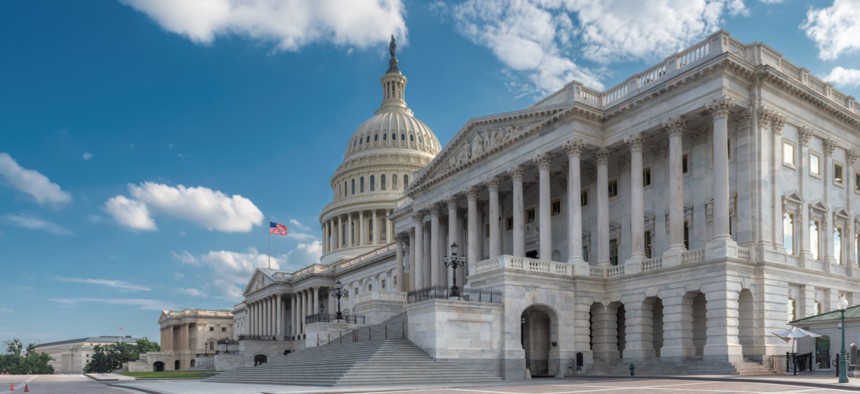As Shutdown Looms, House Votes to Empower Federal CIO, Improve Agency Services

Lucky-photographer/Shutterstock.com
And lawmakers have some questions about Amazon’s facial recognition software.
Lawmakers kept themselves busy last week passing a slew of bills to improve agency tech and requesting details on a couple potentially dubious tech industry deals. Also, we’re rapidly approaching a partial government shutdown if lawmakers don’t reach a deal by the end of the week.
Don’t panic, here’s your rundown:
Goodbye, Office of E-Government
The government’s top tech official may soon be moving up the White House chain of command—and need to pitch Congress on a plan to consolidate IT across federal agencies.
The Federal CIO Authorization Act, introduced by tech-savvy Reps. Will Hurd, R-Texas and Robin Kelly, D-Ill., passed the House by voice vote on Friday. If signed into law, the bill would elevate the federal chief information officer within the federal hierarchy. It would also designate both the federal CIO and federal chief information security officer as presidentially appointed positions, and rename the Office of E-Government to the Office of the Federal Chief Information Officer.
A Customer Service Facelift
On Thursday, the House also approved the Federal Agency Customer Experience Act, which would require agencies to collect feedback on the services it provides to citizens. Officials would then need to aggregate those responses every year and publish them online and in a report to the Office of Management and Budget.
Per the bill, all customer feedback would be voluntary and anonymous, and agencies would be barred from treating citizens differently based on their responses.
The Senate passed its version of the bill in November 2017.
Now There’s an IDEA
Government websites aren’t exactly known for their user-friendly design, but could be changing soon.
The House on Thursday passed legislation that would give federal agencies 180 days to revamp all public-facing websites to make them easier to use for everyday citizens. The 21st Century Integrated Digital Experience Act, sponsored by Rep. Ro Khanna, D-Calif., would require agencies to meet minimum accessibility, searchability and security benchmarks for all new and existing government sites. Sites would also need to be mobile-friendly.
The bill also stipulates organizations roll out online versions of all paper forms within two years. The original legislation would’ve also required agencies to create “digital options” for all in-person services, but lawmakers struck the provision from the final version of the bill.
The bill’s Senate counterpart still awaits a vote.
Congress Gets Smart on the Internet of Things
Lawmakers also want to get up to speed on the internet of things marketplace.
On Wednesday, the House unanimously approved the SMART IoT Act, which would require the Commerce Department to review the production and use of internet-connected devices and report its findings to Congress.
The survey would also provide an overview of any regulations and standards governing internet of things devices at federal agencies. (Spoiler: there aren’t many.)
Put Up (Border Wall Funding) or Shut Up (Federal Agencies)
President Trump isn’t budging on his promise to shut down the government if Congress refuses to allocate $5 billion for a border wall in the final fiscal 2019 spending package.
Congress and the White House have until Dec. 7 to strike a deal on the bill that includes appropriations for the Transportation, Housing and Urban Development, State, Interior, Agriculture, Treasury, Commerce, Homeland Security and Justice departments, among other agencies. If they don’t, some 300,000 federal workers will face furloughs in a partial government shutdown.
Gridlock over the bill is also throwing lawmakers proposed 1.9 percent pay raise for federal employees up in the air. The provision would need to be included in the appropriations bill to override Trump’s proposed pay freeze for civilian employees.
Recognize Us, Jeff?
On Thursday, lawmakers sent yet another letter to Amazon CEO Jeff Bezos demanding details on the company’s sale of facial recognition technology to law enforcement agencies.
Sen. Ed Markey, D-Mass., and seven House lawmakers requested information on how Amazon tests and troubleshoots its facial recognition software, dubbed Rekognition. They also raised questions about law enforcement’s use of the technology and whether protections were in place to protect personal privacy and prevent “secretive government surveillance.”
Civil rights advocates previously voiced concerns about the tech after it misidentified 28 members of Congress as criminals. Lawmakers asked Bezos similar questions in July, but he and Amazon “failed to provide sufficient answers.”
The letter comes days after the FBI disclosed it was using Amazon’s cloud technology, and piloting its Rekognition software, in counterterrorism investigations.
Breaking ‘Ze Rules
Sens. Chris Van Hollen, D-Md., and Marco Rubio, R-Fla., also penned a letter to a trio of cabinet members requesting they investigate whether the Chinese telecom firm ZTE violated U.S. sanctions against the Venezuelan government.
The pair cited a report by Reuters that the company helped the government “build a database that enables the monitoring and tracking of Venezuelan citizens” and “centralize video surveillance.” If the allegations are true, it would mark company’s latest evasion of U.S. sanctions.
ZTE previously flouted trade embargoes against Iran, North Korea, Sudan, Syria and Cuba, while endorsing efforts “to conceal, obscure, and facilitate the evasion of U.S. laws,” lawmakers said.
Coming Up:
House lawmakers have a handful of tech-focused hearings on the docket this week.
On Wednesday at 10 a.m., the House Judiciary Committee will grill Google CEO Sundar Pichai on the company’s data collection practices.
At the same time, the House Armed Services Emerging Threats and Capabilities subcommittee will examine the Pentagon’s investments in artificial intelligence.
At 10 a.m. on Thursday, the House Energy and Commerce subcommittee on Communications and Technology will review efforts to expand internet coverage to more Americans.
NEXT STORY: Quick Hits






